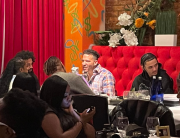Imagine being in a room filled with people, feeling like you don’t belong, compelled to speak louder to be heard. When you decide to close your eyes, and then reopen them, the room is empty, leaving only you behind. In America, many black women find themselves in a climate where they struggle to be heard, seen and fully present, while fighting for recognition and the right to authentically fulfill purpose.
A pressing challenge facing black women today is the prevalence of stereotypes and obstacles that hinder the creation of a safe, seen, and heard atmosphere in crowds or conversations. In these situations, there’s often a sense of vigilance, looking around the room not for validation but to assess who else is present. Confidence becomes more about reclaiming control over the narrative, navigating internal dialogues filled with questions like “why are we here”. The impact of traumatic experiences, coupled with distorted narratives on social media, can contribute to an environment fostering self-doubt, making it easier to believe falsehoods than confronting the truth.
Historically, our history shows dehumanization of black women during slavery, where they were exploited as childbearers, enduring forced pregnancies and family separations at the whim of the slave owners. Understanding these historical traumas is essential as they continue to be transmitted intergenerationally, manifesting in various forms from psychological, emotional and socio-economic challenges. Despite strides made during the Civil Rights Movement in the mid-20th century, challenges persist in the 21st century. Systematic racism, gender-based discrimination, and intersectional biases still hinder black women from being fully heard and recognized.
While facing underrepresentation in various fields and lack of diverse perspective that our voices are inadequately acknowledge persists. The ongoing fight against barriers aims to promote inclusivity. Despite advocacy for black women to assume certain positions, instances of bullying and discrimination persist without resolution. The recent tragic news of Antoinette Candia- Bailey, who reportedly took her own life after experiencing bullying without resolution, highlights the urgent need for systemic change.
In our society, the glass ceiling effect is evident, as outlined in an article by Ralinda Watts from POPSUGAR. Black women often find themselves selected to lead an institution or organization on the verge of collapse, experiencing the pattern of being the last hired and first fired due to systemic issues rooted in failure and ingrained in tokenism. Despite these challenges, it’s crucial to recognize that our voices are essential and hold power. Acknowledging our worth, embracing our unique perspectives, celebrating even small achievements, and engaging in self -care practices contribute to breaking through barriers. James Baldwin once said, “You have to decide who you are and force the world to deal with you not with its idea of you.” By expressing our voices, we possess the ability to shape and change the narrative.







Great Job daughter, very informative and insightful!!!👏